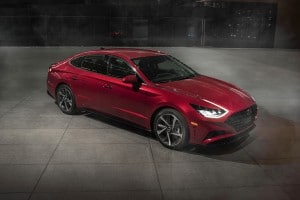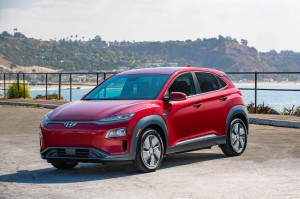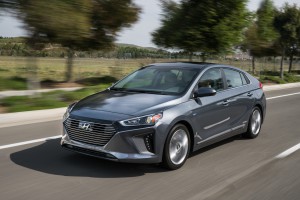Hyundai will introduce an updated version of its electrified Ioniq line at the Los Angeles Auto Show later this month, with a new hybrid version of its midsize Sonata to follow next February. Those models will join a growing array of battery- and hydrogen-powered vehicles the Korean carmaker plans to add to its line-up during the next three years.
By 2022, Hyundai officials revealed today, the number of “eco-focused” products in its U.S. line-up will grow from five to 13. That will include “six alternatively fueled sedans and seven SUVs,” the company said.
Though demand for battery- and hydrogen-powered vehicles has been slow to grow, there are signs that the pace is starting to pick up, said Mike O’Brien, the head of product planning for Hyundai Motor America, presenting a significant growth opportunity.
(Hyundai Neptune fuel cell big rig ready to battle with battery-electric competitors)
In a background briefing, O’Brien noted that the number of Americans who say they’d consider an EV next time they’re in the market for a new vehicle has jumped from 19% in 2016 to 24% today, according to a recent study. And demand is particularly high among the college-educated and high-income households that make up a disproportionate share of new car buyers.

Hyundai is giving the 2020 Sonata a complete makeover for next year. It will also be available as a hybrid, debuting in Chicago next year.
Hyundai officials noted that the industry is being pushed by regulators around the world to deliver improved fuel economy and lower emissions, even as consumers demand improved performance, as well.
The carmaker is pursuing a number of avenues to meet those goals, among other things working to improve conventional internal combustion engines with technologies like the Continuously Variable Valve Duration system introduced on the latest-generation Hyundai Sonata.
(Hyundai Partnering with Aptiv — Targeting “Production-Ready” Robocabs by 2022)
In some markets, Europe in particular, meeting upcoming mandates will clearly require a shift towards alternative powertrain technologies, emphasized Sae Hoon Kim, the head of Hyundai’s global fuel cell development program.
Hyundai was one of the earliest to market a hydrogen powered vehicle, its Tucson FCEV the first model to reach U.S. shores. It has since replaced it with the Nexo, uniquely designed to use a hydrogen fuel-cell.
The Korean marque was slower to get into the battery-car segment, but the update of the Ioniq family and the addition of the Sonata Hybrid – set to debut at the 2020 Chicago Auto Show, will mark just the latest of its electrified line-up. Ioniq is offered in three variants, a conventional hybrid, a plug-in hybrid and an all-electric version. Hyundai also offers a long-range battery-electric vehicle in the form of the Kona EV.
Hyundai officials declined to provide details on what its future “eco-focused” models will be, though they hinted these products should cover a broad gamut of powertrain alternatives.
(Americans buying more EVs than manual transmission cars)
“As the automotive industry evolves to meet the needs of a diverse customer base and environmentally aware society, we will continue to provide alternative propulsion options in a variety of product choices, said O’Brien.”


